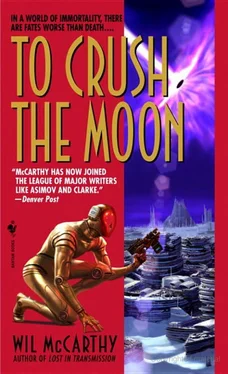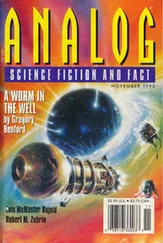“That’s enough, lad,” Bruno tells him gently. “No one likes to hear his old joys and sorrows reduced to a banjo ditty.”
“Ah. Okay.” Young Zuq sounds disappointed. There’s more fun to be had with this, his tone implies. He doesn’t seem to realize it could hurt as well.
Soon, though, the ladders are unrolled and the Dolceti are swinging down onto solid ground. Bruno is nearly the last to go, with only Zuq behind him. The sandy ground is coarse with sharp, angular pebbles that crunch and grind underfoot. The night is very black, and suddenly, inexplicably colder here at ground level.
“Why is it so dark?” Bruno can’t help asking. “I can see the western sky. We’re not in a valley, right? Where do all the photons go?”
“Solar trees,” one of the Dolceti answers over her shoulder. “This is the Black Forest.” The speaker is Parma, one of the “mission mothers.” Bruno isn’t clear on whether this is a formal rank or title, or a job assignment, or just some sort of nickname, but the lowest ranks among the Dolceti are “squad leaders” like Zuq, with “deceants” like Natan just above them. And both ranks act deferentially toward the two mothers, who are the only women in the group. The womens’ age is equally ambiguous; neither one has acquired the lines and sags of full-blown geriatry yet, but the bloom of youth isn’t prominent either. Bruno knows almost nothing about “human” physiology, but if he had to guess, he would put Parma’s age at around forty years.
Anyway. Solar trees, hmm. Is that supposed to be self-explanatory? The first hint of understanding comes as he watches the Dolceti appearing and disappearing around him. Not in the manner of Lyman’s Olders, with their stealth-mode inviz cloaks drawing kilowatts of power from hidden reserves, but in the manner of people walking behind pillars of superabsorber black. Once clear of the gravel airfield, they’ve moved in among a stand of trees. Very, very dark trees. The Dolceti are groping their way through, he realizes, with uncertain steps and their arms out ahead of them. Above Bruno, the starlight has been replaced by a roof of absolute blackness.
He touches one of the trees. Nearly runs into it, in fact, and is saved only by the envelope of cold air around it—characteristic of surfaces which absorb infrared but do not release it. He stops short and—gingerly—reaches out to brush the surface with his fingers. It feels slick, nearly featureless, interrupted only occasionally by small ridges or bumps. If it’s tree bark, it’s far smoother than birch or aspen or anything else he’s familiar with. And it’s cold, drinking in the heat of his fingertips. Reaching up, he can feel limbs as thick as his wrist, branching up and away at forty-five-degree angles.
“Are these natural?” he asks.
“They’re biological,” says Radmer’s disembodied voice, from some distance away. “They grow and die. They drop seeds and sprout forests. The soil conditions have to be just right, but where they are, the solar trees will choke out any other vegetation.”
Indeed, the ground remains a wasteland of sand and gravel, unbroken by grass or moss or even leaf litter. The spacing of the trees, too, is remarkably regular—a sort of honeycomb pattern. Because no tree can grow in the shadow of another, Bruno realizes, and because any open space will surely be colonized. The sprouts must fight it out for dominance, for survival itself, but the contest is rigged from the start: a tree at the edge of a clearing must eventually grow into the shadows of its neighbors, its energy budget forever restricted. A tree at the center of a clearing would have no such constraint, and could reach its full growth and potential without hindrance.
“This is one of the great failed experiments of early Lune,” Radmer expounds. “They were supposed to enrich the world, to bring infrastructure to its remotest corners. And they have, in a way. But the price is steep.”
“So now you’re older than the trees themselves?” Zuq asks, as though he only half believes it.
And Bruno tells him, “When our Radmer here first stood upon this sphere, son, there wasn’t even air. There wasn’t even gravity, not as you feel it now. It took him two hundred years to make a world of it. But he had built other worlds before this one.” He waves a hand at the sky. “Out there, among the stars. Where the blackberries grow.”
“Such sorcerers we have in our midst!” Zuq laughs, and again he’s only half joking. For the second time, Bruno feels a surge of sympathy for these unlucky people. To Zuq, this grotty little war is epic in scope! The history behind him seems unimaginably vast, with an uncertain future ahead and himself at the cusp, a young hero on a desperate quest. His humor is of the funereal variety; he expects his life to be violent and short. He expects his noble death to be written up in a song, if indeed his people survive at all.
Bruno feels a sudden urge to hug this young man, to rub his head, to offer some reassurance. But there’s nothing to say, for the situation really is desperate. And anyway Zuq is off in the trees somewhere, separated from Bruno by four meters of blackness. So fortunately the urge is not difficult to resist, and the lad escapes with his dignity intact.
Then, suddenly, Bruno and Radmer and the Dolceti are in a clearing, with buildings all around. It isn’t a natural clearing—black little sprouts and silver-gray stumps attest to the violence of its maintenance—but here the light can travel for more than a few meters. Here in this little bubble it can reflect, and re-reflect, and mingle with the starlight raining down from above.
“Bestnight,” says a soldier leaning in a doorway. It’s a Luner greeting Bruno has heard once or twice already. “Luck unto yer.”
“Danks,” replies Captain Bordi. “Luck en yer hold’n dis pass. We will’n no enemy et ours back, right?”
“Right,” the soldier agrees. There are other signs and sounds of activity here, but the place has a sleepy, dolorous feel to it. An air of fatalism, of doom. These ordinary soldiers are an afterthought in the epic; their job is simply to die, to hold the borders for a while and then be overrun. And yet there’s discipline here; there’s a man in every doorway, grimly standing his watch. At the side of the “highway”—really just a thin ribbon of tar and crushed rock—sits a shack atop a three-meter tower, with lamps burning brightly and three men waving semaphore flags up and down, left and right. Dutifully transmitting the nation’s network traffic by the effort of their own eyes and arms.
Bruno’s first surprise is the stream of refugees trickling uphill, against the pull of gravity. A family of four rolls by on a pair of six-wheeled scooters, whirring with the unmistakable tones of the old-fashioned electric motor. Up ahead, almost lost in the gloom, he can make out the lights of a slightly larger group. These are not traumatized people, hollow with the shock of murder and destruction. Indeed, he hears the sound of laughter drifting along the road, and the cases and trunks strapped to the vehicles show every sign of having been packed with care and forethought. These families have simply done the math, and concluded that the coastal lowlands of central Imbria are no longer the fashionable place to be.
And though Bruno is hardly in a position to criticize them, he asks, “Where are they going?”
“Manilus, probably,” Radmer answers. “It’s a large enough city to absorb a few extras. If their treaders hold out, if nothing breaks down, they’ll be behind city walls again by morning.”
“Will they be safe there?”
“For an extra few Luner days, I imagine. It hardly seems worth the effort, but people always do this. In a way it’s admirable: squeezing out the last few drops of the good life, refusing to buy into the gruesome promises of war. And more often than you’d think, some miracle really does intervene, and spare them the nightmares they’ve never quite believed in.”
Читать дальше












